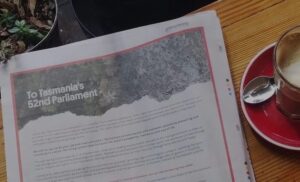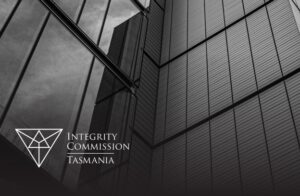Share
First published in The Examiner, 28 March 2018
On Tuesday, The Australia Institute Tasmania launched a new initiative cheekily titled #WTF2050 – What’s Tasmania’s Future?
The project brings together some of the state’s best thinkers to answer the question – where do you want Tasmania to be in 2050?
What’s your big hairy goal and what strengths does Tasmania already have to help us get there?
Some say ideas are like backsides – everybody has one.
But ideas are the basis for creating the future that we want.
If we want to create a future that is the best it can be, then everyone needs to be a part of the conversation.
Change is inevitable; its direction is not.
People have agency over technology, markets and other exogenous forces.
The future of Tasmania will be shaped by the daily choices Tasmanians make and the choices we make for our future.
Our political debate too often thinks small and is locked in the past, fighting old battles, and our politicians operate in a system that is adversarial rather than inspirational.
Even less frequent are ideas and conversations that think a generation ahead.
If 2050 seems like a long way off, have a look back at what changes occurred during the past 30 years.
Time and social norms move quickly.
It was only three decades ago that the High Court blocked construction of the Franklin Dam.
Platforms to collaborate on ideas and innovation, without being restricted by our official roles are few and far between, and that’s where #WTF2050 comes in.
#WTF2050 founding Ambassadors include; independent economist Saul Eslake, TV creator and author Posie Graeme-Evans, this year’s Tasmanian of the Year Scott Rankin, last year’s Tasmanian of the Year Rosalie Martin, former discrimination commissioner Robin Banks, curator of Dark Mofo’s Winter Feast Jo Cook, Jessica Robbins from GLiSPA (Global island Partnership), and American contemporary art curator, artist, and practitioner of sustainable architecture Kirsha Kaechele.
The Australia Institute chose Tasmania to trial this idea because it’s small enough to manage and big enough to matter.
It’s a state of Australia with all of the benefits enjoyed by a state but a population similar to that of a large mainland municipality.
Tasmania’s natural environment is spectacular – to find it in such untouched wildness in 2017 is extraordinary.
Tasmanians love the Tasmanian landscape, whether it’s driving a four-wheel-drive, recreational fishing, or hiking through untouched wilderness, we are more often sitting outside our shacks than inside our lounge rooms.
We are a small island state in one of the richest countries and safest democracies in the world. We are a connected community.
In a rapidly changing economic and physical world, if Tasmania cannot successfully navigate change – who can?
We find ourselves in a privileged position, and we must make the most of it and make sure it’s shared by all Tasmanians.
The project will run for two years and involve regional workshops, kitchen cabinets, storytelling weekends and more.
Anyone who wants to get involved in the project can find out more by visiting the website at WTF2050.org.au.
Between the Lines Newsletter
The biggest stories and the best analysis from the team at the Australia Institute, delivered to your inbox every fortnight.
You might also like
Open Letter to the Tasmanian Government
The Australia Institute and 30 other organisations from around Tasmania have published an open letter with 10 asks for the environment from whomever forms Tasmania’s next government. When cross-benchers and major parties have struck successful power-sharing agreements elsewhere, they covered policy as well as procedure, making now the ideal time for progress.
Are Australians eating diseased salmon? Sickening new revelations from Tasmania
Shocking new revelations about Tasmanian salmon should leave all Australians feeling sick to the stomach.
Underfunded, toothless and lacking transparency – time for a new era of integrity in Tasmania
As Tasmania’s newly elected politicians jostle to form government, new analysis from The Australia Institute shows that a deal to address integrity would be popular among election-weary voters.



